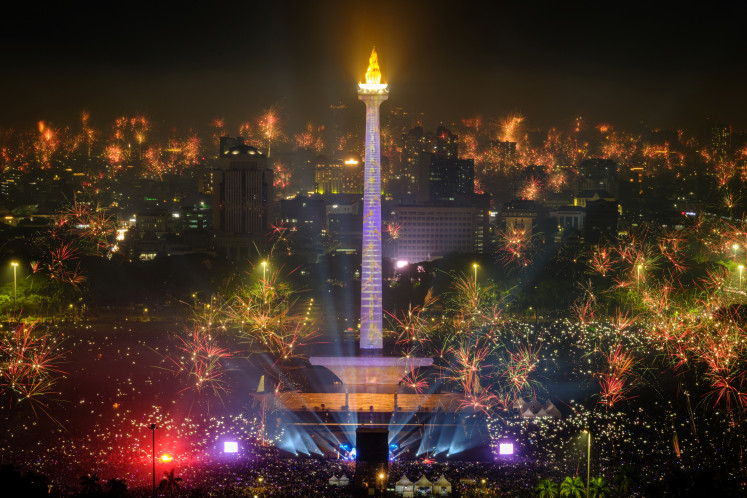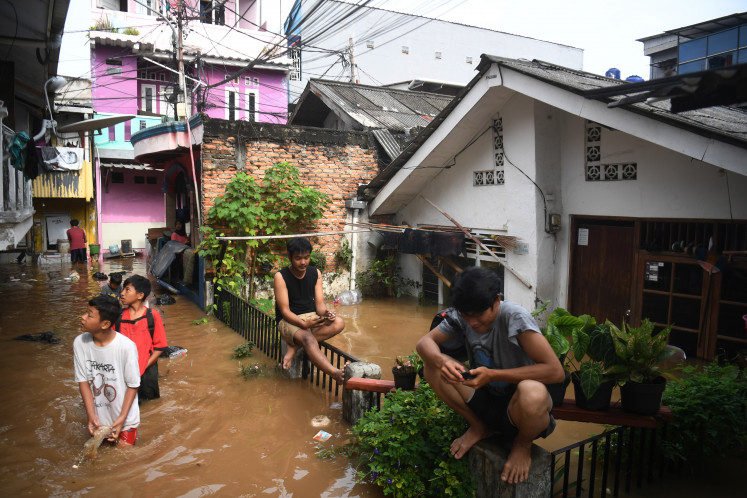Popular Reads
Top Results
Can't find what you're looking for?
View all search resultsPopular Reads
Top Results
Can't find what you're looking for?
View all search resultsTrash burning chokes planet but still taken lightly
When it comes to disposing of trash, some of us might opt for the quick and easy way, burning it
Change text size
Gift Premium Articles
to Anyone

When it comes to disposing of trash, some of us might opt for the quick and easy way, burning it. Trash burning is still very common in Greater Jakarta where people often burn trash on vacant land in packed residential areas despite its harmful effect on both people and the environment and the fact that it is illegal.
A recent news report stated that an infant in Sindang Jaya district in Tangerang, Banten, was found to be suffering from an acute respiratory infection (ISPA) thought to have been caused by inhaling fumes from the burning of hazardous and toxic waste (B3).
The family of the 1-month-old baby lived some 150 meters from a plot of land where people burned B3 waste. Some residents said the practice had been going on for years, some even said burning trash was their source of income.
“People salvage the good quality plastic [waste], then burn the rest,” a resident named Muslimah said recently as quoted by kompas.com.
Enjoying fresh and clean air in the morning is impossible in the area, Muslimah added, because people usually burned the trash at night with the fumes lingering until the next morning. There are dozens of burning spots within the area.
Such acts are actually punishable by law as the government, at both the central and regional level, has a set of legal instruments that ban people from burning waste.
The 2008 Waste Management Law specifically stipulates in one of its articles that “burning waste in a manner that is not in accordance with the technical requirements of waste management” is forbidden.
Jakarta and its satellite cities also have their own regulations on the same matter.
Experts have warned that burning trash, particularly non-organic waste, poses a threat to health and the environment. Plastic waste containing carbon and hydrogen mixed with the chloride found in food waste emits harmful gases that contain toxic matter called dioxins when they are burned altogether.
If dioxins are inhaled, it can instantly cause coughing, shortness of breath and dizziness. Long-term exposure to dioxins can also cause cancer. Not only that, the gas also causes air pollution that could damage the ozone layer and eventually contribute to the greenhouse effect.
Jakarta has recently been in the spotlight for its deteriorating air quality, which according to air quality monitor software company AirVisual has made the capital city one of the world’s most polluted cities.
The choking smog has also prompted the administration to scramble to mitigate the issue by issuing several policies to curb air pollution.
One of these is pushing residents to use public transportation more as vehicles contribute the most to air pollution in the city.
The Jakarta Disaster Mitigation Agency (BPBD) also recently urged residents not to burn trash to reduce the impact on air quality.
“Burning trash can cause dust and black smoke that can cause pollution,” the BPBD said in a statement in July adding that the burned trash released carbon dioxide that could lead to global warming.
Head campaigner of urban and energy at the Indonesian Forum for the Environment Dwi Sawung said the rampant practice of trash burning was mainly a result of poor law enforcement and a lack of awareness among urban residents.
In enforcing the regulations, Dwi added, imposing firm sanctions against those who pollute the environment by littering and burning waste is important. However, that should go hand-in-hand with improvements in public waste management.
“The improvements should be made at all stages, starting from the small units in every residential area all the way to the larger scale. The government must make sure that each type of waste is treated properly,” he said.
Among those who burn waste because of the lack of an alternative waste-management system is Bekasi, West Java, resident Rahma, not her real name. She said her husband and many of their neighbors still burned their trash whenever the garbage collector was late picking up their household waste.
“Sometimes it can be up to two weeks. Imagine how much trash we have collected within that period of time. We just can’t stand it,” she said, noting that she pays Rp 15,000 (US$1.05) a month for a waste-collection service.
“In our case, we sort out the waste beforehand. My husband only burns plastic [or dry] waste, not the organic stuff. He does it on small a plot of land in front of an empty house,” the employee of a private company added.
In the capital, Jakarta Environment Agency head of sanitation management Ahmad Hariadi claimed the agency imposed firm punishments to create a deterrent effect for people caught in the act of littering or burning trash.
“People who burn their waste are similar to litterbugs and we have implemented a regular patrol to catch and punish them. The sanction is up to Rp 500,000 in fines,” he told The Jakarta Post.
However, he said the officials more often caught illegal dumpers than those who burned their trash.
“Sometimes, we only find burned garbage by the side of a road when there is nobody around. Maybe we can do it if people report to us when they see someone doing it, so we can immediately catch them,” he said.









